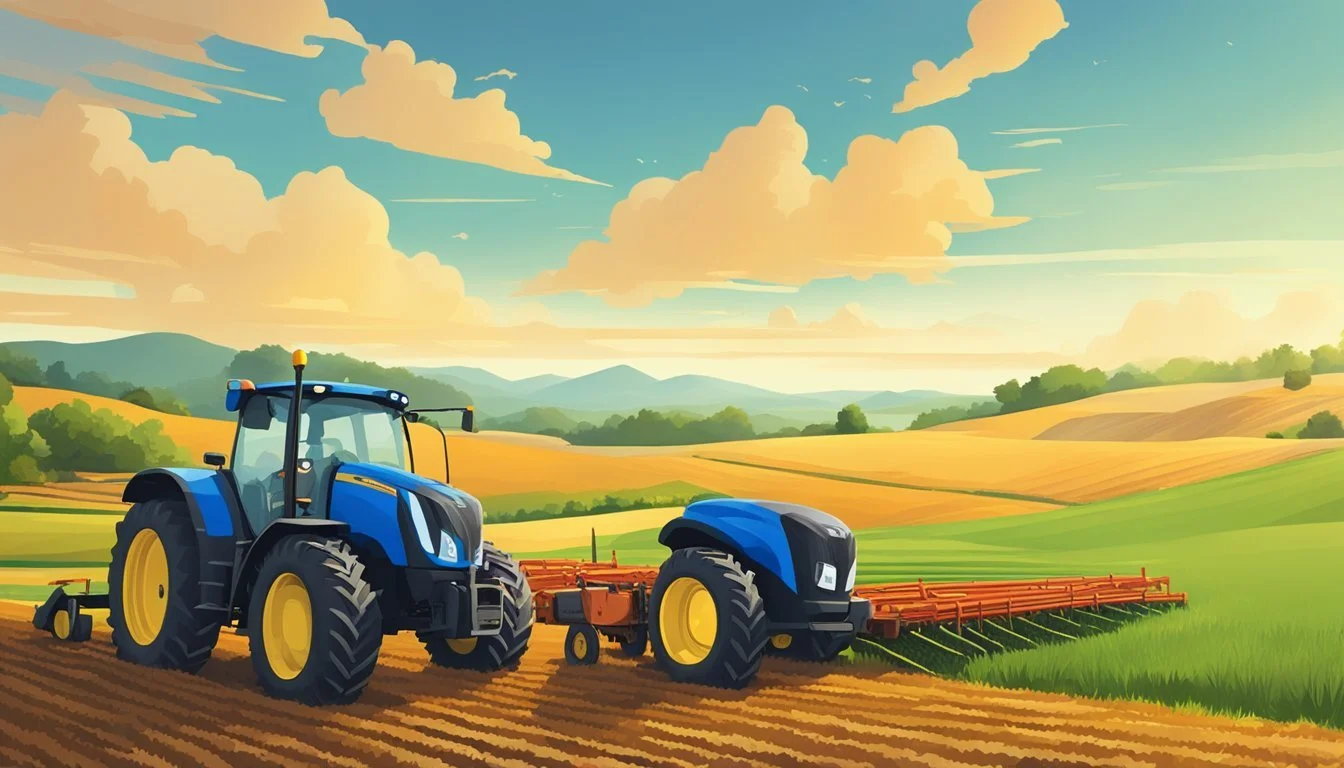Farming Communities in Kentucky
Sustaining Tradition and Innovation
Farming communities in Kentucky have a rich history and play a crucial role in the state's economy and cultural identity. Nestled among rolling hills and fertile plains, these communities thrive on the production of diverse crops and livestock, reflecting a deep agricultural heritage. From expansive ranches to charming small farms, the landscape is dotted with properties dedicated to sustaining both the livelihoods of farmers and the needs of the wider community.
These farming communities offer a unique glimpse into a way of life that values hard work, tradition, and a strong connection to the land. Local farmers are known for their resilience and innovation, often embracing sustainable practices to ensure the longevity of their farms. This balance between tradition and modernity creates a dynamic agricultural sector that continues to adapt to changing economic and environmental conditions.
Moreover, the social fabric of Kentucky's farming communities is characterized by camaraderie and mutual support. Events like county fairs and farmers' markets foster a sense of community, bringing people together to celebrate and share their produce. These gatherings also serve as crucial opportunities for both new and established farmers to exchange knowledge and collaborate, further strengthening the agricultural network across the state.
History and Development of Farming in Kentucky
Farming in Kentucky has evolved significantly, starting from early settlement periods to modern agricultural practices. Key influences include the contributions of early settlers and the economic impacts of tobacco farming.
Influence of Early Settlers
Early settlers like Daniel Boone and James Harrod were pivotal in establishing agriculture in Rural Kentucky. Boone, known for his exploration of the Kentucky frontier, identified fertile lands suitable for farming. Settlers cultivated crops like corn and grains, which were crucial for their survival.
Henry County became one of the significant agricultural hubs due to its fertile soil. The area's farming development was marked by the increase in the number of small farms, with many averaging around eighty-five acres.
With the passage of time, the influence of American Farmland Trust and other organizations played a role in preserving agricultural heritage. They promoted sustainable farming practices and ensured that farming remained a vital part of Kentucky's economy.
Tobacco emerged as a key crop, especially the burley variety, which became integral to Kentucky's agricultural identity. The economic success of tobacco farming helped many small farms thrive, ensuring the continuity of rural agricultural communities.
Structure of Farming Communities
The farming communities in Kentucky are diverse, encompassing family-owned farms, contributions from Amish and Mennonite groups, corporate farms and agribusinesses, and the effects of subdivisions on land use.
Family-Owned Farms
Family-owned farms remain the backbone of Kentucky's agricultural landscape. These primarily small-scale farms, averaging 171 acres, contribute significantly to local economies and adhere to traditional agriculture practices. The management of these farms often passes through generations, ensuring continuity and sustainability. Many of these farms engage in diverse cropping and livestock operations, fostering resilience and adaptability.
Amish and Mennonite Contributions
Amish and Mennonite communities play a pivotal role in Kentucky’s agriculture. Known for their land-conserving practices and strong community networks, these groups focus on sustainable farming techniques. They typically avoid modern machinery, prioritizing manual labor and horse-drawn tools. Their farms are admired for their productivity and commitment to organic farming methods, thereby maintaining the health of the soil and reducing environmental impact.
Corporate Farms and Agribusiness
Corporate farms and agribusinesses are integral to Kentucky’s agricultural economy. These entities engage in large-scale production with extensive acreage, often using advanced technology and machinery. Corporate farms help in meeting the high demand for agricultural products and provide substantial employment opportunities. Despite their economic benefits, the rise of corporate farming sometimes raises concerns about environmental impact and the displacement of small farmers.
Subdivisions and Land Use
The development of subdivisions has a significant impact on Kentucky’s farmland. As urban sprawl continues, valuable agricultural land is frequently converted into residential areas. This sprawl leads to a reduction in available farmland and can threaten the viability of family-owned farms. Efforts to manage and conserve land are crucial to maintaining the agricultural heritage and ensuring that Kentucky’s farming communities thrive despite these pressures.
Agricultural Practices
In Kentucky, agricultural practices consist of diverse methods and traditions, including crop production, soil management and conservation, livestock and meat production, and organic and sustainable agriculture.
Crop Production
Kentucky farmers cultivate a variety of crops, with tobacco, hay, and vegetables being among the most significant. Tobacco has a long history in the state, though production has decreased in recent years. Hay is crucial, especially for feeding livestock through winter months.
Vegetable farming has gained attention, supported by local markets and agricultural programs. Farmers utilize crop rotation and advanced irrigation to enhance yields and maintain soil fertility. Training programs from institutions like the USDA help improve techniques and ensure productivity.
Soil Management and Conservation
Soil is a vital asset for Kentucky farms. Effective soil management practices focus on maintaining soil health and preventing erosion. Techniques such as cover cropping, no-till farming, and crop rotation are widely implemented.
Conservation efforts emphasize the efficient use of non-renewable resources and the sustenance of farm operations. The state's agricultural sector collaborates with the USDA and other agencies to promote sustainable soil practices, ensuring long-term viability and environmental quality.
Livestock and Meat Production
Livestock farming is central to Kentucky's agriculture. Cattle farming, in particular, is a significant industry, supported by the production of hay which serves as a key feeding component. Kentucky is also known for its contributions to the meat market, including initiatives like Our Home Place Meat, which promotes local beef.
Farmers integrate modern practices to enhance efficiency and ensure the health of their livestock. These practices include improved breeding techniques, nutritional management, and veterinary care, which are essential for maintaining herd quality and market competitiveness.
Organic and Sustainable Agriculture
The interest in organic and sustainable agricultural practices is growing in Kentucky. The Organic Association of Kentucky plays a pivotal role in supporting farmers transitioning to organic methods. These practices focus on eliminating synthetic inputs and fostering biodiversity.
Sustainable agriculture practices, defined by integrating animal and plant production, aim to satisfy food needs while enhancing environmental and economic viability. Initiatives and education programs encourage Kentucky farmers to adopt sustainable methods, balancing productivity with ecological stewardship.
Economic Impact of Agriculture
Agriculture in Kentucky plays a pivotal role in shaping the local and regional economy. It provides numerous job opportunities, supports local businesses, and contributes significantly to the state's economic stability.
Local and Regional Markets
Agriculture supports local and regional markets by supplying fresh produce, meat, and dairy products. Community markets and farmers' markets thrive, allowing growers to sell directly to consumers.
This direct marketing helps keep profits within the community, promoting healthy regional economies. In 2019, the total economic impact of agriculture in Kentucky was $49.6 billion, indicating robust growth and prosperity for the Bluegrass State.
Job Creation and Roles
Agriculture is a major job creator in Kentucky. It directly provides jobs in farming and indirectly supports roles in processing, marketing, and distribution.
According to research, the number of farms in Kentucky is approximately 69,100, employing thousands in various capacities. This employment bolsters the population, supporting local community dynamics.
Value-Added Agricultural Products
The production of value-added agricultural products significantly enhances the economic impact of agriculture in Kentucky. Products like jams, cheeses, and artisan goods enable farmers to generate higher income.
This sector promotes business and entrepreneurial opportunities, helping diversify income sources for growers. Value-added production is critical for maintaining competitive and sustainable agricultural businesses.
Community Life and Culture
Farming communities in Kentucky are characterized by a strong sense of unity, vibrant cultural traditions, and dedicated efforts to maintain rural education systems. These elements intertwine to establish a unique and rich community life that supports the agricultural backbone of the state.
Education and Rural Schools
Education in Kentucky's farming communities is deeply rooted in local values and agricultural knowledge. Rural schools often emphasize practical skills that are essential for farming life.
Berea College, known for offering tuition-free education, plays a pivotal role in providing access to higher education for students from Appalachia. Many rural schools partner with community organizations and farming families to offer programs related to sustainable agriculture.
Families and neighbors support each other, ensuring that children gain both formal education and hands-on farming experience. This blend of education helps maintain the agricultural legacy and ensure a knowledgeable future generation.
Cultural Events and Traditions
Cultural events form the heart of Kentucky's farming communities. Traditions such as harvest festivals, county fairs, and barn dances are common. These events celebrate local produce and craftsmanship, bringing together community members to share food, music, and stories.
Wendell Berry, a prominent advocate for local farming, has influenced many of these traditions. His writings and initiatives through the Berry Center promote sustainable agriculture and community cohesion.
Local festivals often feature folk music, traditional dances, and home-grown products, demonstrating the region's rich heritage. These gatherings not only provide entertainment but also strengthen communal bonds and foster a sense of belonging.
Rural and Small Community Dynamics
Life in Kentucky’s rural areas is characterized by close-knit communities where neighbors support one another. Trust and cooperation are essential, especially during planting and harvest seasons.
Farms in these areas are usually family-owned and operated, contributing to tight community dynamics. The Amish, with over 15,000 members in the state, add a distinct cultural layer with their own unique traditions and communal ways of living.
Villages and small towns serve as social hubs where residents meet regularly, often at local markets or community centers. This setup fosters deep connections and a strong sense of community resilience.
Challenges Facing Kentucky Farming Communities
Kentucky farming communities are struggling with significant issues such as urban sprawl, environmental concerns, and economic challenges. These issues impact land use, sustainability, and the economic viability of farming in the state.
Urban Sprawl and Loss of Farmland
Urban sprawl has become a critical concern for Kentucky’s farming communities.
As cities expand, farmland is increasingly being converted into residential and commercial areas. This expansion threatens the agricultural base that has long been a key part of Kentucky’s economy. The state has lost a significant amount of farmland, negatively impacting local food production and farming livelihoods.
Efforts to combat this issue include promoting compact urban development. This approach aims to reduce sprawl and preserve valuable agricultural land. However, balancing development with conservation remains a challenging endeavor for policymakers and planners.
Environmental and Sustainability Issues
Environmental concerns are another significant challenge for Kentucky farmers.
Soil conservation, water quality, and sustainable farming practices are crucial for long-term agricultural productivity. Practices like crop rotation and organic farming are being adopted to improve soil health and reduce environmental impact. Despite these efforts, climate change and other environmental factors pose ongoing risks to farming activities.
Sustainability initiatives are gaining traction, yet they require considerable investment. Farmers need access to resources and education to implement effective conservation strategies. Support from government and local organizations is essential to advancing these initiatives.
Economic and Policy Challenges
The economic viability of Kentucky's farming communities is under continuous threat.
The decline of the tobacco industry has forced many farmers to diversify their operations. This transition has been difficult, with high costs and uncertain market conditions. Funding opportunities and agricultural policies play a pivotal role in supporting farmers through these changes.
Financial assistance and grants can aid farmers in adapting to new crops and technologies. Policies that promote local agriculture and provide economic relief are necessary to sustain farming communities. Engaging in advocacy and policy reforms can help address these economic challenges and support the state's agricultural future.
Innovations and Adaptations
Kentucky's farming communities are leading the charge in agricultural innovation, with advancements in technology, community support systems, and diverse farming practices that collectively enhance productivity and sustainability.
Technological Advancements in Farming
Kentucky farmers are increasingly adopting state-of-the-art technologies. Precision agriculture tools, such as GPS-guided tractors and drones, are transforming traditional farming operations. These technologies enhance crop monitoring, improve field management, and optimize resource usage, leading to higher yields and reduced costs.
Smart greenhouses are another innovation, using automated systems for climate control, irrigation, and fertilization. This ensures crops can be grown year-round regardless of external weather conditions, maximizing output and productivity. Additionally, farmers benefit from real-time data and analytics to make informed decisions on crop management.
Community-Supported Agriculture
Community-Supported Agriculture (CSA) programs are vital in Kentucky's farming landscape. Through CSA, consumers invest in local farms, receiving shares of the harvest in return. This system ensures financial support for farmers ahead of the growing season, reducing economic uncertainty.
CSAs also strengthen connections between farmers and consumers, fostering a community-centric approach to agriculture. Participants often receive fresh, locally-grown produce, enhancing food security and supporting the local economy. Such programs exemplify the community's role in sustainable agricultural practices, ensuring long-term growth and resilience.
Diversification and Specialty Farming
Kentucky farmers are diversifying their crops to include specialty varieties that cater to niche markets and emerging trends. Specialty crops, such as heirloom tomatoes, organic produce, and herbs, are in high demand, fetching premium prices.
By embracing diversification, farmers mitigate risks associated with market fluctuations and environmental changes. This strategy also opens new revenue streams and market opportunities. Agri-tourism, including farm-to-table experiences and educational tours, is another innovative approach that diversifies income and enhances community engagement.
These methods illustrate a proactive approach to farming, ensuring adaptability and growth in an ever-evolving agricultural sector.
Resources and Support for Farmers
Kentucky offers a wealth of resources and support for farmers, including educational programs, government and NGO assistance, and infrastructure and equipment solutions. These resources are aimed at improving farm operations and sustainability.
Educational Programs and Assistance
Kentucky farmers can access a variety of educational resources to improve their knowledge and skills. The Kentucky Center for Agriculture and Rural Development (KCARD) offers programs on sustainable farming practices and business management. Additionally, the Kentucky Horticulture Council provides specialized support for crop growers, including advice on modern agricultural techniques.
Berea College is another key player, offering educational outreach as part of its commitment to regional development. Workshops, seminars, and certification courses are readily available to promote agricultural education.
Furthermore, mental health resources, such as holistic psychotherapy provided by professionals like Parker Bowling (CSW), ensure comprehensive farmer well-being. These programs ensure that Kentucky farmers have the knowledge and support needed to thrive.
Government and NGO Support
A variety of government and non-profit organizations provide essential support to Kentucky's farming communities. The USDA offers grants and funding opportunities aimed at improving farm infrastructure and promoting sustainable practices.
The Kentucky Farm Bureau, founded in 1919, represents the interests of agricultural producers and offers extensive support, including lobbying for favorable policies and providing insurance services.
Non-profit organizations like the Shaping Our Appalachian Region (SOAR) provide low-interest loans for small food-related producers. The Kentucky Center for Agriculture and Rural Development (KCARD) also plays a crucial role by offering grants and ongoing support for farm assessments and improvements.
Infrastructure and Equipment
Infrastructure and equipment are critical for modern farming operations. The KSU Small Scale Farm and Education Grants help Kentucky farmers purchase necessary equipment, with funding up to $5,000.
The state's OneStop Business Portal is a valuable resource, allowing farmers to easily register their businesses and gain access to various state-level services.
Community organizations like the Organic Association of Kentucky (OAK) focus on advancing organic and regenerative agricultural practices. OAK provides technical assistance, educational resources, and market-support services to promote ecological resilience.
By addressing infrastructure and equipment needs, these resources ensure that Kentucky farmers can maintain efficient and profitable operations.
Future Outlook of Kentucky’s Farming Communities
Kentucky’s farming communities face a future shaped by demographic shifts, market dynamics, and environmental challenges. These elements will significantly influence agricultural practices and community sustainability.
Demographic and Market Trends
Kentucky's farming demographics are evolving as younger generations often move away from rural areas, leading to aging farmer populations. Census data illustrates a rise in small-scale farms and local food markets. However, agricultural cash receipts are expected to decrease slightly from $8.3 billion in 2022 to $8.1 billion in 2023, reflecting a tightening economic landscape. Future developments such as advanced farming technologies and market diversification could help sustain economic viability. Enhanced market analysis is crucial for farmers to adapt to these changing conditions.
Conservation and Land Stewardship
Land stewardship remains central to the agricultural outlook in Kentucky. Conservation programs are increasingly important in combating soil erosion and preserving agricultural lands. With approximately 3,200 farms at risk by 2040 due to urban development, it is critical to implement more robust land protection strategies. These conservation efforts help maintain the ecological balance essential for long-term farming success. Land stewardship initiatives are expected to grow, promoting sustainable farming practices and ensuring that agricultural lands are protected from non-agricultural development.
Adapting to Climate Change
Kentucky's farming communities need to enhance climate resilience to manage more frequent extreme weather events. Promoting climate-smart agricultural practices is vital for sustaining crop yields and livestock productivity. Environmental planning and adoption of adaptive strategies like diversified cropping systems and water management innovations are essential. Public and private stakeholders must collaborate to support farmers in this transition, ensuring that agriculture remains viable amid shifting climatic patterns. Further investment in climate change adaptation programs can significantly strengthen the sector’s resilience.








